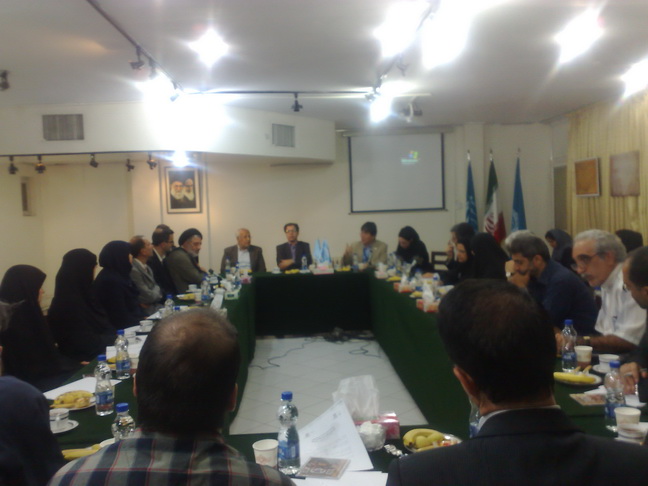Some Actions Proposed for Further Promotion of Memory of the World in Iran

- © UNESCO/A. Gunawan
- Participants in MoW Meeting
Some Actions Proposed for Further Promotion of Memory of the World in Iran
In order for Iran to be able to have further achievement in the field of UNESCO’s Memory of the World (MoW) programmes, some concrete actions could be considered by parties involved in this programme. These actions include the need to integrate a study of MoW in higher education, organising further training programmes to facilitate the preparation and submission of MoW’s items, and creating wider network with other institutions for the promotion of MoW.
“We need to put more efforts along this line, as it is only through this way that the national capacity can be built up,” said Mr. Qunli Han, Director and Representative of UNESCO Tehran Cluster Office (UTCO), in his opening remark at a meeting on MoW, held at the office of Iranian National Commission for UNESCO (Iranian Natcom), in Tehran, Tuesday, 12 July 2011. The meeting was organised by Iranian Natcom, with support from UTCO, to celebrate the inscription of two new items of MoW from Iran. The meeting that was chaired by Dr Saeidabadi, Secretary- General of Iranian Natcom, was attended by more than 30 participants who have been associated with MoW programme in Iran, including members of Iranian National Committee for MoW.
The three actions mentioned by Director of UTCO above are parts of recommendation issued by the 4th International UNESCO Memory of the World Conference that took place in Warsaw, Poland, 18-21 May 2011. In addition to these actions, Mr. Han also put an emphasis on the importance of establishing a national strategy with a long-term goal, through which technical aspects of MoW will be easier to sort out. For instance, within a clear national strategy it will be easier to decide from which period in the history of Iran to be prioritised when identifying the MoW’s items.

Many good ideas were also discussed during the meeting, such as the importance to identify and create a database of endangered MoW’s items, the need to have a broader exchange of items from different countries and regions, as well as the need to linking up the MoW programme with public broadcasting organisation so that promotional materials in the form of short video clips can be produced and broadcast to create better public understanding on the MoW.
During the discussion, the forum was also informed about a number of initiatives that have been taking place in Iran. One of these initiatives is series of workshops on MoW funded by municipalities, as good evidence that the MoW programme has a great potential for sustainability.
The forum also listened to presentations on the preparation of the two items that were recently submitted by Iran and approved by the International Committee for official inscription of MoW. The two items are Al-Tafhim Li Awa’il Sana’at al-Tanjim or the Book of Instruction in the Elements of the Art of Astrology by Abu-Rayhan Muhammad ibn Ahmad al-Biruni and Collection of long poems of Nezami’s Panj Ganj.
.jpg/Tehran_Natcom_MOW%2Bevent_Qunli%2Binterviewed%2Bby%2BTV%2B(4).jpg)
The two new items have enriched the three previous MoW’s items from Iran, namely The Deed for Endowment: Rab’ I-Rashidi (Rashidi Endowment, a 13th Century Manuscript) and Baysonghori Shahnameh (Prince Baysongho’s Book of the Kings, a manuscript from 15th century), both were registered by Memory of the World’s International Committee in 2007; Administrative Documents of Astan-e Quds Razavi in the Safavid Era (a 69,000-page manuscript from 16th century, containing information on administrative, social, economic, agricultural, endowment, religious and other issues that provide the reader with information on the status of social life in the Safavid era) which was registered in 2009. In conjunction with the meeting, there is a 3-day public exhibition to display all the five items Iranian MoW’s items, starting from 12 July.
MoW is one of the programmes under the UNESCO’s Communication and Information Sector. This is an important programme to create a global campaign to generate awareness on the value and significance of documentary heritage, which contains information in the forms of languages, cultures, and various items of human’s achievement in the past, in many fields related to knowledge (i.e.: literature, philosophy, law, politics, science, and spirituality). These rich records are fragile yet irreplaceable. Although these records have been kept and maintained throughout history in libraries and archives, many substantial parts of them have been lost or damages, either by natural and man-made disasters, or by the results of irresponsible human actions. Through MoW programme, these precious heritages will be preserved, and access will be made available so that younger generations can learn many great lessons from the heritage.
Contact: Arya Gunawan Usis, Advisor for Communication and Information, UTCO, a.gunawan@unesco.org
- Source:UNESCO Tehran
- 12-07-2011
- © Arya Gunawan Usis/UNESCO - Some of the MoW’s items are on display in the exhibition.
- © Arya Gunawan Usis/UNESCO - Director and Representative of UTCO, Mr. Qunli Han during a media interview after the meeting.

